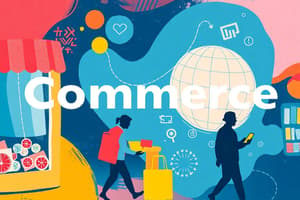Podcast
Questions and Answers
Which type of commerce primarily involves transactions conducted over the internet?
Which type of commerce primarily involves transactions conducted over the internet?
- International Commerce
- Retail Commerce
- Wholesale Commerce
- E-commerce (correct)
What is a key function of commerce that directly influences market expansion?
What is a key function of commerce that directly influences market expansion?
- Enhances market reach (correct)
- Promotes economic growth
- Facilitates trade
- Provides financial services
Which of the following is NOT considered a key component of commerce?
Which of the following is NOT considered a key component of commerce?
- Transportation
- Marketing
- Human resources (correct)
- Insurance
What impact does sustainability have on contemporary commerce?
What impact does sustainability have on contemporary commerce?
Which trend in commerce is characterized by a focus on adapting shopping experiences to individual preferences?
Which trend in commerce is characterized by a focus on adapting shopping experiences to individual preferences?
What challenge in commerce is specifically related to maintaining the security of transaction data?
What challenge in commerce is specifically related to maintaining the security of transaction data?
Which of the following assertions about wholesale commerce is accurate?
Which of the following assertions about wholesale commerce is accurate?
Which trend indicates a significant shift in how commercial transactions are conducted?
Which trend indicates a significant shift in how commercial transactions are conducted?
What is a primary way commerce contributes to economic development?
What is a primary way commerce contributes to economic development?
What is an example of international commerce?
What is an example of international commerce?
Flashcards are hidden until you start studying
Study Notes
Definition of Commerce
- Exchange of goods and services.
- Involves various activities such as buying, selling, and trade.
Types of Commerce
-
Retail Commerce
- Involves selling goods directly to consumers.
- Examples: supermarkets, online stores.
-
Wholesale Commerce
- Involves selling goods in bulk to retailers or other businesses.
- Typically at lower prices per unit.
-
E-commerce
- Buying and selling goods/services over the internet.
- Includes B2B (business to business) and B2C (business to consumer) transactions.
-
International Commerce
- Trade between businesses in different countries.
- Involves import and export regulations.
Key Components of Commerce
- Trade: The act of buying and selling goods and services.
- Transportation: Movement of goods from producers to consumers.
- Banking: Provides financial services to facilitate transactions.
- Insurance: Protects businesses against risks associated with commerce.
- Marketing: Activities that promote products and services to consumers.
Functions of Commerce
- Facilitates trade: Supports the exchange of goods and services.
- Promotes economic growth: Drives job creation and improves standards of living.
- Enhances market reach: Expands access to products for consumers.
Importance of Commerce
- Contributes to GDP and economic development.
- Enables consumer choice and competition.
- Supports innovation and the development of new products and services.
Trends in Commerce
- Digital transformation: Increasing reliance on technology for transactions.
- Sustainability: Growing demand for eco-friendly products and practices.
- Globalization: Expanded market reach across international borders.
- Personalization: Tailoring shopping experiences to individual preferences.
Challenges in Commerce
- Regulatory compliance: Navigating laws and regulations.
- Supply chain disruptions: Affecting product availability and prices.
- Cybersecurity threats: Protecting sensitive transaction data.
Future of Commerce
- Continued growth of e-commerce and mobile commerce.
- Advances in AI and data analytics for personalized marketing.
- Increased focus on sustainability and ethical sourcing in products and services.
Definition of Commerce
- Commerce is the exchange of goods and services through various activities including buying, selling, and trading.
Types of Commerce
- Retail Commerce: Involves direct sales to consumers through establishments like supermarkets or online stores.
- Wholesale Commerce: Focuses on bulk sales to retailers or businesses, offering lower unit prices.
- E-commerce: Encompasses online buying and selling, including B2B (business to business) and B2C (business to consumer) transactions.
- International Commerce: Involves trade between countries, requiring compliance with import and export regulations.
Key Components of Commerce
- Trade: Central activity of buying and selling goods and services.
- Transportation: Essential for moving goods from producers to consumers.
- Banking: Offers financial services that facilitate transactions.
- Insurance: Provides protection against risks in commerce.
- Marketing: Engages in promoting products and services to attract consumers.
Functions of Commerce
- Facilitates trade: Enables the exchange of goods and services efficiently.
- Promotes economic growth: Contributes to job creation and enhances living standards.
- Enhances market reach: Expands access to a variety of products for consumers.
Importance of Commerce
- Plays a significant role in GDP contribution and overall economic development.
- Provides consumer choice and fosters competition in the marketplace.
- Encourages innovation and the introduction of new products and services.
Trends in Commerce
- Digital Transformation: Heightened reliance on technology for conducting transactions.
- Sustainability: Growing consumer preference for eco-friendly products and sustainable practices.
- Globalization: Expanded market access facilitates international trade.
- Personalization: Customizes shopping experiences to align with individual customer preferences.
Challenges in Commerce
- Regulatory Compliance: Navigating complex laws and regulations can pose difficulties.
- Supply Chain Disruptions: Affect availability and pricing of products due to various factors.
- Cybersecurity Threats: Necessitates protection of sensitive data involved in transactions.
Future of Commerce
- Anticipates continued growth in e-commerce and mobile commerce avenues.
- Emphasizes advancements in AI and data analytics for targeted marketing strategies.
- Increasing attention towards sustainability and ethical sourcing in business practices.
Studying That Suits You
Use AI to generate personalized quizzes and flashcards to suit your learning preferences.




